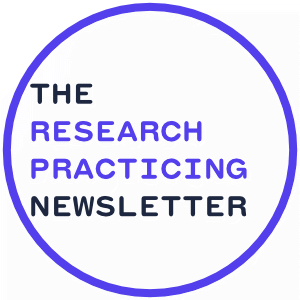📕 An update on the Research Practice book
Hello!
This is the latest Research Practicing newsletter by Gregg Bernstein. Thank you for subscribing.
I love a good prompt. If there’s anything you’d like to see me cover in a future dispatch, get in touch!
Now here's what's hot off the presses this week at gregg.io:
First, thanks to everyone who signed up for this mailing list; I’m humbled that there are 275 folks who are interested in my in-progress book, Research Practice.
Today I thought I’d share some of my process, as well as my plans for development and publication of this book.
The process
I’m an early riser. There’s nothing better than waking way before the sun—before the kids need to be packed up for school and before responsibilities take over—and starting the day with a text editor and a hot cup of coffee.
I start writing at 5:30 each morning, and plug away until 6:50 when the kids arise. I don’t always fill that time with writing—sometimes I need to stare at my outline a bit and orient my current thoughts within the larger story I’m telling. Sometimes I noodle on the right word choice or the best phrase for a solid hour. But it doesn’t matter—it’s my time and my words.
I’ve been thinking about this topic for a few years now, which has manifested as a couple of conference talks, lots of conversations with allies in the industry, a whole lot of affinity mapping, and finally as a book outline. To be honest, I’m a better outliner than mapper, and feel like affinity mapping took me too far afield. Something about a nested list of words clarifies everything for me in a way that a cluster of notes doesn’t.
I use the Bear notes app to write, and I keep my outline in a window on the left half of my screen, with my current chapter in a separate window on the right. If I keep the outline visible at all times, it both keeps me on track and reassures me when I have moments of “WTF are you even doing, Bernstein?”

The book outline (l) and a chapter-in-progress (r)
I start a new note for each chapter, and I’m writing everything in markdown. When I write something but I think it needs more rigor, I highlight the text to remind myself to revisit it. When I stop writing each morning, I add a comment at my last passage that simply says, “Stopping point.” I do this because from time to time I end up writing out of sequence, so picking up where I left off is not as simple as scrolling to the end of a note.
The writing plan
A long time ago, I asked Nicole Fenton, editor extraordinaire, to work with me as I develop this book. (Since then, Nicole joined me as a colleague at Vox Media, which… more Nicole Fenton is a good thing. I highly recommend it.) She’s been my sounding board as I articulate my thoughts and explore content directions. I’m nearly at a stopping point for the first half of the book, at which point I’ll pause to reexamine the content with Nicole and make edits based on her suggestions.
Then I’m going to follow the advice Jake Knapp, author of Make Time and Sprint, offered to me: open source the process. I’m going to share an excerpt and the chapter descriptions with this mailing list in a Google Doc, and then ask for your feedback in a survey. Your input will help me shore up any gaps and clarify anything that’s unclear.
The publishing plan
My favorite UX book of the past few years is Abby Covert’s How to Make Sense of Any Mess (also edited by Nicole Fenton). She published it herself. My favorite research book of the past few years is Jan Chipchase’s Field Study Handbook. He published it himself.
Research Practice is a labor of love. It’s a book of takeaways from my experiences, and I’m doing it on my terms. I am confident in the content and its presentation, and I plan to publish this book myself. Thanks to Brad Frost and Abby Covert’s detailed documentation of going through this process themselves, I have a model to follow.
What’s next
In the next newsletter, look for a link to an excerpt, a near-final list of chapters, and a survey for your feedback.
Other news
I’ll be speaking at the Strive conference in Toronto on 6 June 2019. The conference is presented by the UX Research Collective, and is two full days of research content.
My talk is part of the research leadership track, and I’ll tell stories about how research leadership sometimes means simply being the person who makes sure all perspectives are represented in forming organizational strategies. Interested? Learn more here.
Onward,
Gregg
- Want to offer feedback or a suggestion for a future issue? Hit reply or get in touch here
- Access all my content on my website, gregg.io
- Buy my book, Research Practice

